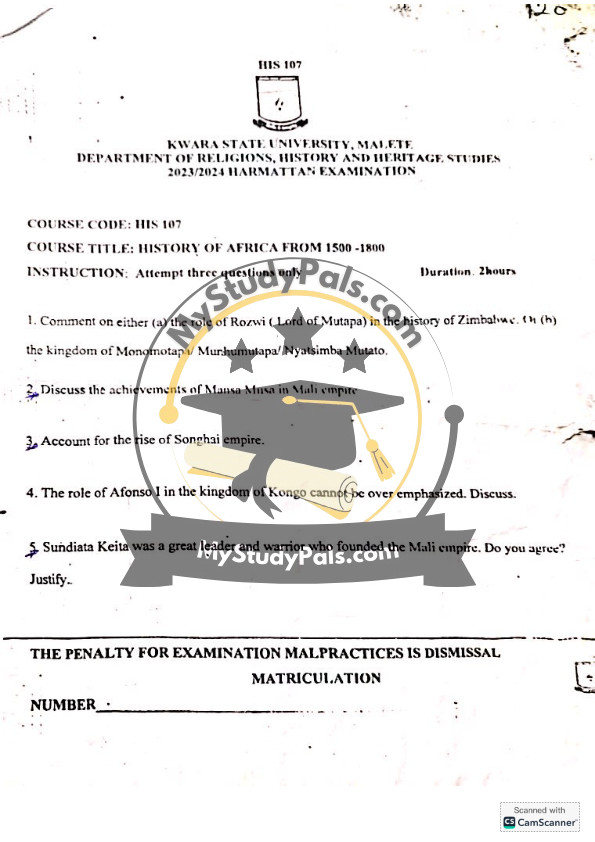ANWSER
Question 1:
Comment on either (a) the role of Rozwi (Lord of Mutapa) in the history of Zimbabwe or (b) the kingdom of Monomotapa/Murhumutapa/Nyatsimba Mutota.
Answer:
(a) The Role of Rozwi (Lord of Mutapa) in the History of Zimbabwe
The Rozwi empire was a powerful kingdom in present-day Zimbabwe during the late 17th and 18th centuries. The Rozwi, led by Changamire Dombo, successfully resisted Portuguese colonization, driving them out of the region. They were known for their military prowess, cattle-based economy, and advanced stone architecture similar to Great Zimbabwe. The Rozwi played a crucial role in consolidating political power, expanding trade networks, and fostering agricultural prosperity in Zimbabwe.
OR
(b) The Kingdom of Monomotapa/Murhumutapa/Nyatsimba Mutota
The Kingdom of Monomotapa was founded by Nyatsimba Mutota in the 15th century. It was a powerful Shona kingdom that controlled vast territories in present-day Zimbabwe and Mozambique. The kingdom was famous for its control over gold mines, which made it an important trading partner with Arab and Portuguese merchants. It had a centralized political system and relied on military strength to expand its influence. The kingdom’s decline was influenced by internal conflicts and Portuguese interference in the 17th century.
Question 2:
Discuss the achievements of Mansa Musa in the Mali Empire.
Answer:
Mansa Musa (ruled 1312–1337) was one of the greatest rulers of the Mali Empire, known for his wealth, influence, and promotion of Islam. His achievements include:
- Expansion of the Empire: He significantly expanded Mali’s territory, incorporating regions such as Timbuktu and Gao.
- Wealth and Economy: He controlled vast gold reserves, making Mali one of the richest empires of the time.
- Famous Pilgrimage to Mecca (Hajj): His 1324 pilgrimage displayed Mali’s wealth to the world. He distributed so much gold in Egypt that it caused inflation for years.
- Promotion of Education and Islam: He built mosques, including the famous Djinguereber Mosque in Timbuktu, and established Islamic schools and libraries.
- Development of Trade: Under his rule, Mali became a major center for trans-Saharan trade, facilitating commerce in gold, salt, and other goods.
Mansa Musa’s legacy strengthened Mali’s position as a cultural and economic powerhouse in West Africa.
Question 3:
Account for the rise of the Songhai Empire.
Answer:
The Songhai Empire rose to power in the 15th century due to several factors:
- Strategic Location: Positioned along the Niger River, Songhai controlled important trade routes connecting North and West Africa.
- Strong Leadership: Leaders like Sunni Ali (1464–1492) expanded the empire through military conquests, securing control over major cities like Timbuktu and Gao.
- Military Strength: The empire had a well-trained army and an efficient navy that controlled riverine trade.
- Economic Prosperity: Songhai thrived on trans-Saharan trade in gold, salt, and slaves, making it one of the wealthiest states in Africa.
- Islamic Influence: Under Askia Muhammad (1493–1528), Islamic governance and scholarship flourished, attracting scholars and traders.
- Efficient Administration: Askia Muhammad introduced bureaucratic reforms, dividing the empire into provinces governed by trusted officials.
The Songhai Empire reached its peak in the late 15th century but eventually declined due to internal conflicts and Moroccan invasions in 1591.
Question 4:
The role of Afonso I in the Kingdom of Kongo cannot be overemphasized. Discuss.
Answer:
Afonso I (ruled 1506–1543) played a significant role in shaping the Kingdom of Kongo through:
- Adoption of Christianity: He converted to Christianity and made it the state religion, aligning Kongo with Portugal.
- Relations with Portugal: He established diplomatic and trade relations with the Portuguese, promoting European-style education and governance.
- Centralization of Power: He strengthened the central authority of the king, reducing the power of regional chiefs.
- Economic Changes: Under his rule, Kongo became involved in the Atlantic slave trade, which initially brought wealth but later weakened the kingdom.
- Legal and Administrative Reforms: Afonso I introduced European-style laws and governance systems, influencing the kingdom’s political structure.
Despite his efforts, Kongo faced challenges from Portuguese exploitation, leading to internal strife and eventual decline.
Question 5:
Sundiata Keita was a great leader and warrior who founded the Mali Empire. Do you agree? Justify.
Answer:
Yes, Sundiata Keita was a great leader and warrior who founded the Mali Empire. Justifications include:
- Victory Over the Sosso Kingdom: He led the Battle of Kirina (c. 1235) against King Sumanguru Kante, defeating the Sosso and establishing Mali as a powerful state.
- Political and Administrative Reforms: Sundiata created a centralized government with a clear division of power, strengthening the empire’s administration.
- Expansion of Mali: Under his rule, Mali expanded significantly, incorporating regions rich in gold and trade routes.
- Promotion of Trade: He encouraged trade along the trans-Saharan routes, boosting Mali’s economy through gold and salt commerce.
- Cultural and Social Contributions: He established the Manden Charter, one of the earliest human rights declarations, promoting justice and unity.
His legacy as the founder of Mali laid the foundation for its golden age under later rulers like Mansa Musa.


